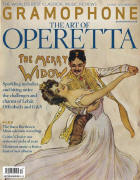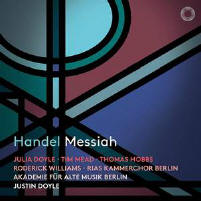Texte paru dans: / Appeared in: |
|
|
Outil de traduction (Très approximatif) |
|
|
Reviewer:
Lindsay Kemp An Anglo-German partnership is fitting for Handel, and here we have the RIAS Kammerchor Berlin under their English conductor with the Akademie für Alte Musik Berlin and an appetising quartet of British soloists (including the conductor’s sister) coming together to run their talents over one of the most familiar of Herr Händel’s works. What do they come up with? Well, the Akademie are simply one of the world’s finest baroque orchestras, technically immaculate but also with a distinctive woody strength to their sound; just as in their recent Handel Op 6 recordings (10/19, 4/20), it is great to hear inner lines emerging from time to time with sinewy self-confidence. And they are terrific in agitated music such as ‘Why do the nations rage’ or the ‘refiner’s fire’ section of ‘But who may abide’, and give a firm bucolic dignity to the Pifa. The soloists, too, are great to listen to. Julia Doyle has a voice of bewitching clarity, with an uncomplicated grace and precision that recalls early Carolyn Sampson. She shows a hint of fragility, too, in ‘I know that my redeemer liveth’ that adds to its touching effect. Tim Mead is a superb countertenor whose richly lyrical voice, almost like a contralto in places, has not a weak note in it, and is a constant pleasure to hear. Thomas Hobbs, after a strangely tired-sounding ‘Ev’ry valley’, beguiles with his toffeed tenor, and Roderick Williams, while sometimes treading carefully through passagework, is an effortless master of the drama in recitative and aria alike. Yet, odd as it may seem given the excellence of this singing, all four of them are just that little bit too present in the balance for either realism or true comfort. Or rather, they are just too present compared to the choir, who, as a result, and good as they are, lack the focus and punch we are used to from British, male-altoed choirs. But perhaps Justin Doyle has a hand in this. Right from his smooth-sided Overture it is clear that he is keen to avoid overloading the oratorio with bombast by holding things back in places, the better to release his forces more effectively elsewhere. Sometimes – indeed perhaps a little too often – he lets things flag too much, as in the disappointingly low-key ending to ‘His yoke is easy’ or the surprisingly joyless ‘O thou that tellest’. In other places he judges it shrewdly; the performance hits its stride in the choral sequences of Part 2, for instance, probing their contours and contrasts for dramatic effect and culminating in a thrillingly manipulated ‘Hallelujah’. Perhaps the single most effective example of Doyle’s controlled approach, however, is the refreshingly gently unpompous ‘The trumpet shall sound’, where joy and wonder are instead allowed their heads most freely in the ornaments Williams lets loose in the da capo. This, then, is a Messiah of good performances, but in the end it needs its many nice new ideas to cohere more consistently to make it a top recommendation among so many strong rivals. |
|




